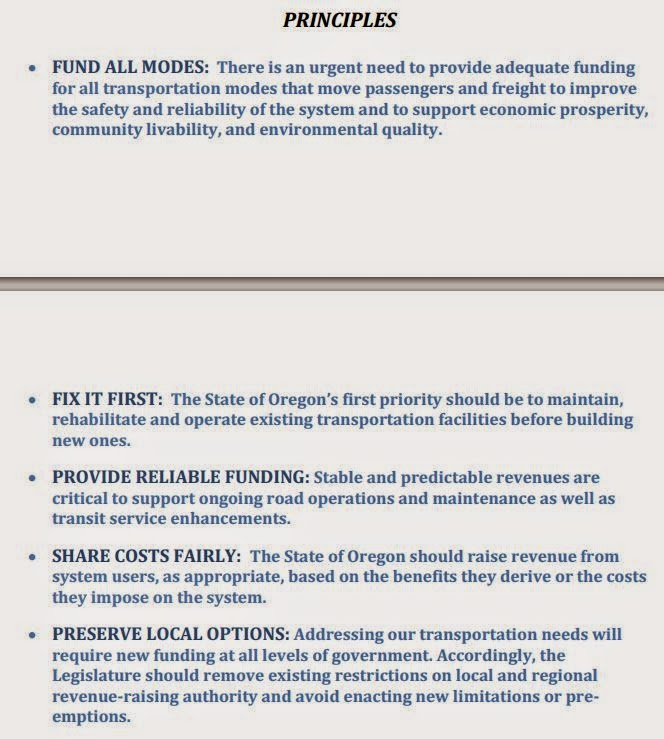Old Business
 |
| OTF Principles for Legislative Package in 2015 |
Mike Jaffe provided an overview of the OTF [Oregon Transportation Forum] Legislative proposal to increase funding to maintain and improve the transportation system in the state.What does the Committee support? The recent editorial by two of the Committee members who are also on the SRC Oversight Team makes it clear.
There are five principles of the OTF proposal: fix it first, fund all modes, provide reliable funding, share costs fairly, and preserve local options. Mr. Jaffe reported that while Metro and Central Lane MPO support the OTF proposal, Albany MPO has abstained from supporting it. The other MPOs the state in the state, including SKATS, have yet to weigh-in with their positions....
Motion was made by Cathy Clark, seconded by Bob Krebs, to approve of the 5 principles of the Oregon Transportation Fund Legislative Proposals. Those voting in favor of the motion were Cathy Clark, Bob Krebs, Paul Kyllo, Anna Peterson, Craig Pope, and Gary Tiffin. Sam Brentano opposed the motion. Dan Fricke abstained. The motion passed with six votes for the motion, one against the motion, and one abstention....
Chair Cathy Clark announced the results of the individual OTP [OTF?] proposal support vote. Dan Fricke, ODOT, abstained from voting on any of the proposals; the other seven Committee members voted. The Committee does not support the “Orphan Highway Program” (three in support, four not supporting) or the “Amtrak Cascades Service” proposal (three in support, three not supporting, one abstention). The remainder of the individual proposals are supported by a majority of the committee members present. [italics added]
 |
| Amtrak and Bikes bad, Bridge and Highway good! |
Commissioner Sam Brentano concurred with Commissioner Pope that the counties will not support any funding scenario except for the 50-30-20 split [State-County-City]. He added that he is not in favor of the cities and counties inheriting any orphan highways. He also supports contributions from bicyclists and pedestrians toward transportation infrastructure and maintenance...There's a lingering institutional bias on the Committee in favor of disadvantaging modes - or at least delaying and deferring them - other than drive-alone trips. It's not so hard to see why Cherriots, who depends on funding that passes through the MPO, has not offered a better defense of transit in the context of the Salem River Crossing.
Commissioner Pope commented that while many people seem to favor contributions in some form from bicyclists, to date no practical method has been found that would not have higher administrative costs than would be realized in revenues. He noted that a majority of bicyclists have cars and therefore do contribute to transportation funding....
Commissioner Brentano reiterated his lack of support for the bicycle/pedestrian and orphan highways proposals. He expressed appreciation that the OTF proposal does not include climate change/greenhouse gas recommendations.
New Business - on the Agenda
 |
| 12th Street at McGilchrist to get sidewalks and bike lanes (railings for Clark Creek culvert in foreground) |
- 12th Street widening project north boundary moved from McGilchrist to Hoyt; the south end still terminates at Fairview. This formalizes the project for sidewalks and bike lanes at the Clark Creek culvert and by the new medical clinic (image above).
- Repairs to OR-22 path: "Project to grind and inlay a portion of the asphalt path that is along the north side of OR 22 between Rickreall Road and Doaks Ferry Road at a total cost of $155,000 using state bikeway funds. This project will be added to the FY 12-FY 15 STIP and the FY 12-FY 17 MTIP and will roll into the FY 15-FY 18 STIP and the FY 15-FY 20 MTIP."
- Center Street Bridge maintenance: "Preservation project to place a membrane, address the joints, and overlay the deck of the Center Street bridge at a total cost of $4.3million using National Highway Performance Program funds. This project was added to the draft FY 15-FY 18 STIP and will be added to the FY 15-FY 20 MTIP."
the Land Conservation and Development Commission adopted new rules, codified as OAR 660 - 044,setting targets to guide long range planning by Oregon’s largest urban areas to reduce greenhouse gas emissions from auto travel. The rule calls for local planners to explore ways to reduce emissions from auto and light truck travel by 17 percent to 21 percent per person by the year 2035.This has been our response:
The greenhouse gas reduction targets will help guide the state’s six metropolitan areas; Portland, Salem-Keizer, Corvallis, Eugene-Springfield, Rogue Valley and Bend as they update land use and transportation plans over the next several years.
Some members of the Policy Committee have characterized the proposed rule as unfunded, ineffective, and obtrusive.And our MPO has basically refused to do anything on it until it is funded. That is, we have to keep the same amount of money being spent on carspace and "business as usual" and any changes to that has to come from new money. Reallocating existing funding has not been acceptable. It's the same thing with bike/ped stuff: We have to have a dedicated source of new funding. We can't reallocate existing funding streams as we have new priorities. The governing philosophy seems to be that all change must be in addition to the status quo, rather than changes to the status quo itself.
So here we are, four years in, and this summer the DLCD is going to do a round of review and revision on long range planning and greenhouse gases by auto travel. The question is whether our MPO will participate voluntarily, or continue to delay, defer, and generally seek to avoid participation.
 |
| Next month the 2015 review draft will be out |
SKATS Policy Committee meets at noon on Tuesday the 24th at 100 High St. SE, Suite 200, above Bar Andaluz and Table Five 08.


No comments:
Post a Comment